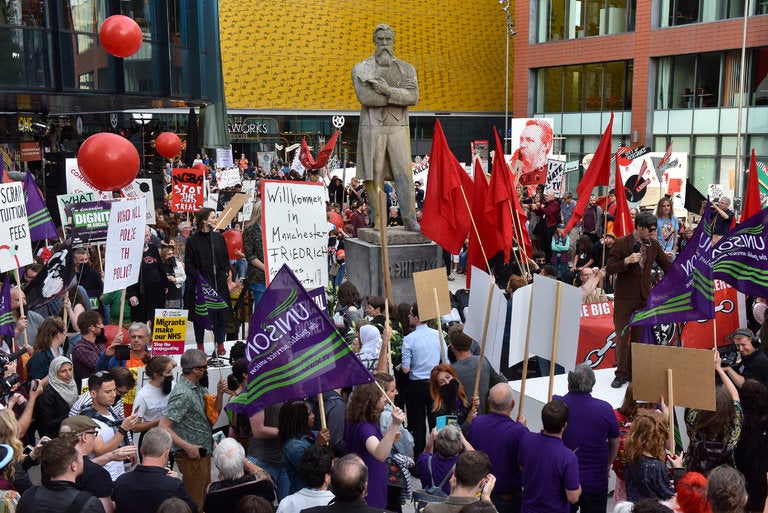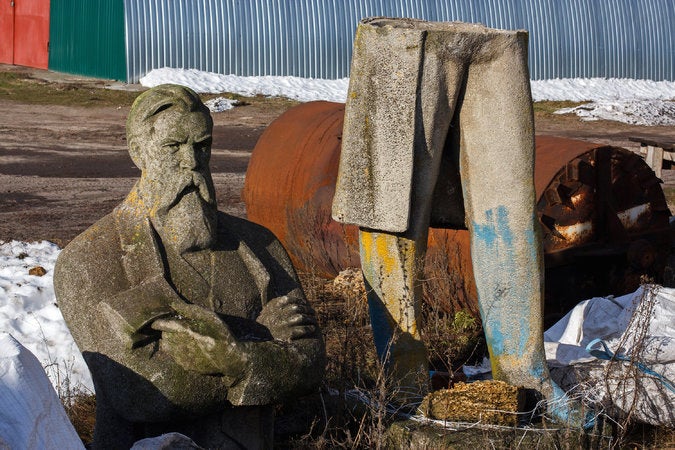A communist icon toppled in Ukraine is restored. In England
A statue of Friedrich Engels, who collaborated with Karl Marx, has been erected in Manchester, where his research made him famous

After 147 years, Friedrich Engels is back in town. Statues of Engels, Karl Marx’s collaborator, may have been ripped down all over the former communist world, but he has returned here, to the city that made him famous. His resurrection in Manchester, where he conducted research on the working class in the 1840s, is thanks to Phil Collins – the acclaimed artist who has made Engels the centrepiece of his most recent project, Ceremony.
“I started working on this theme about 10 years ago,” says Collins, who was nominated for the Turner Prize for British visual arts in 2006. Immersing himself in the history of the Industrial Revolution and of socialism in Manchester, he stumbled upon a quote by a local civil servant, who raised the idea of transporting an Engels statue from Ukraine to Manchester.
Since most Soviet-era statues were removed from their pedestals and destroyed after 1989 – and an Engels likeness was rather rarer than the ubiquitous Lenin – finding the statue was not easy. Collins travelled for about a year across Eastern Europe before finally finding his prize in an agricultural compound in a district that he says was once named after Engels in the Poltava region of eastern Ukraine.
The statue, 12 feet tall, had been cut in half and dumped. But on 15 May, the halves were hauled on to a truck and sent on their way to Manchester. On its travels through Europe, captured on film, the truck stopped in Engels’s birthplace, Barmen, now part of the city of Wuppertal in north-west Germany.
The Engels project was funded by Manchester City Council and was featured recently as the closing event of the biennial Manchester International Festival of the arts. The statue was ceremonially welcomed in front of the HOME art theatre, as a high-spirited crowd gathers in the parking lot to watch the film. Super Furry Animals singer Gruff Rhys performs “Communism’s Coming Home.”

“Engels changed the course of history,” says Noel Callaghan, 45, a local resident.
The ceremony also marks the centennial of the 1917 Russian Revolution, which was inspired by the ideas of Marx and Engels in their “Communist Manifesto” of 1848. And much of their analysis was based on Engels’s own masterwork, “The Condition of the Working Class in England,” published three years before.
In Manchester, Engels is still revered. Alexandra Prodan, a 27-year-old medical secretary from Romania who has been living in Manchester for eight years, says the problem with communism was not with Marxist theory per se. “In practice,” Prodan says, communist regimes “became totalitarian and oppressive.”
Callaghan agrees. “Corrupt people,” he says, “they corrupt things, don’t they?”
Prodan adds: “Even in the countries where people were oppressed, people were looking out for each other in a way. There was still a feeling of togetherness against the regime. This is basically what Engels wrote about. You know, it’s about the people coming together.”
The newly erected statue is not the only tribute to Engels in the city. At the University of Salford, not far from where Engels worked at his family-owned mill, an innovative sculpture of Engels’s iconic beard, meant to be climbed, is intended, the university claims, “to inspire the next generation of artists, musicians and performers.”
The statue is now installed in the city centre to grant Engels “official recognition”, Collins says. Of course, things have changed a bit since his day. The statue now stands among such temples of Western capitalism as a McDonald’s and a Hilton.
The festival’s artistic director, John McGrath, says he expects the statue’s new location to “invite people to think and ignite debate”. In Collins’s words: “What’s interesting about socialism is that it announces itself.”
Why Engels? To the artist, it’s all about contradictions, “the contradictions we all live in.”
“Engels ran his family’s factory,” and yet he was dedicated to the emancipation of the working class, Collins says.
“He was a capitalist by day and a communist by night,” he adds.
Like Engels, Collins suggests: “Nobody’s outside of a system. We’re all kind of bound to it.” He deemed Manchester to be home to “important movements connected with social justice and with resistance.”
Manchester, of course, retains a strong air of socialism. Not only did it elect a Labour member of Parliament in the recent general election, but 94 of the 96 city councillors are members of the Labour Party. “We’ve got lots of statues for other 19th-century figures,” says the leader of the Manchester City Council, Richard Leese. “Why not give one to a German Manchester socialist?”
It is hard to find a dissenting voice at the dedication of the statue. When asked about possibly glorifying a figure whose life’s work came to be associated with political regimes that ended up immiserating countless millions of people, Callaghan says that was not the point. “I don’t think we’re necessarily celebrating it,” he says. “With time, you’ve got to acknowledge what happened in the past, don’t you?”
Barbara Woods, 70, who has accompanied her husband to the event, was practically alone in mildly criticising the idea. “We are for the working class,” she says. “But I’m not 100 per cent sure about a statue.
“Personally, I don’t see any need for it,” she continues. “I think we should let things lie and rather have a statue of somebody representing the region, not somebody who’s come from somewhere else.”
She suggested another influential part-time Mancunian, who worked at the Manchester Evening News for three years: “Why not George Orwell?”
© New York Times
Join our commenting forum
Join thought-provoking conversations, follow other Independent readers and see their replies
Comments
Bookmark popover
Removed from bookmarks